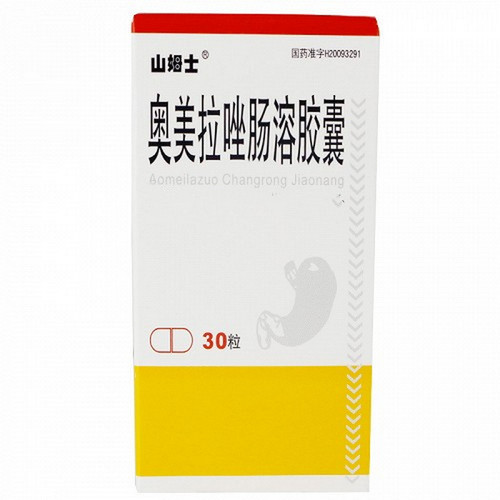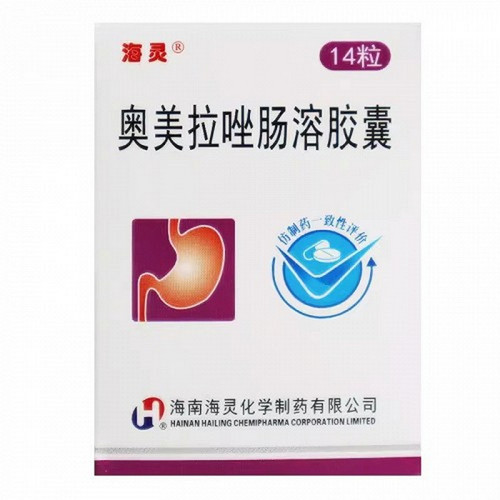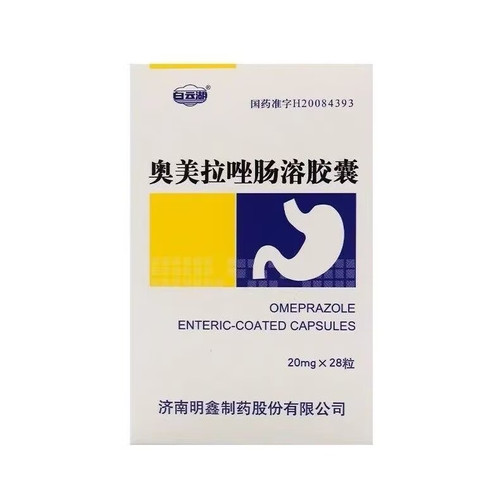Product Overview
[Drug Name]
Generic Name: Omeprazole Enteric-Coated Capsules
Trade Name: KeLun Omeprazole Enteric-Coated Capsules 20mg*28 Capsules
Pinyin Code: KeLun AoMeiLaZuoChangRongJiaoNang 20mg*28Li/He
[Main Ingredients]
The main ingredient of this product is omeprazole.
[Properties]
This product contains white or off-white enteric-coated pellets or granules.
[Indications/Main Functions]
Indicated for gastric ulcers, duodenal ulcers, stress ulcers, reflux esophagitis, and Zollinger-Ellison syndrome (gastrinoma).
[Specifications]
20mg*28 capsules (KeLun)
[Dosage and Administration]
Oral administration, do not chew.
1. Peptic ulcer: 20mg (1 capsule at a time), 1-2 times daily. Take the drug once daily in the morning or once in the morning and evening. The treatment course for gastric ulcers is usually 4-8 weeks, and for duodenal ulcers is usually 2-4 weeks.
2. Reflux esophagitis: Take 20-60 mg (1-3 tablets) once or twice daily. Take the drug once daily in the morning or once in the morning and evening. The treatment course is usually 4-8 weeks.
3. Zollinger-Ellison syndrome: Take 60 mg (3 tablets) once daily. The total daily dose can be adjusted to 20-120 mg (1-6 tablets) depending on the condition. If the total daily dose exceeds 80 mg (4 tablets), the dose should be divided into two doses.
[Adverse Reactions]
This product is well tolerated. Common adverse reactions include diarrhea, headache, nausea, abdominal pain, flatulence, and constipation. Rarely, elevated serum aminotransferases (ALT, AST), rash, dizziness, drowsiness, and insomnia may occur. These adverse reactions are generally mild, disappear spontaneously, and are not related to dose.
[Contraindications]
This product is contraindicated in patients with allergies, severe renal impairment, and infants and young children.
[Drug Interactions]
This product may delay the elimination of drugs metabolized by the liver, such as diazepam, phenytoin, warfarin, and nifedipine. When used with these drugs, the dosage of the latter should be reduced.
[Precautions]
1. When treating gastric ulcers, the possibility of ulcerative gastric cancer should be ruled out first, as this product may alleviate symptoms and delay treatment.
2. Use with caution in patients with hepatic and renal impairment.
3. This product is an enteric-coated capsule. Be careful not to chew it when taking it to avoid premature release of the drug in the stomach, which could affect its efficacy.
[Pediatric Use]
There is no experience with its use in children. This product is contraindicated in infants and young children.
[Elderly Use]
Follow your doctor's instructions.
[Overdose]
Unknown.
[Pharmacology and Toxicology]
Proton pump inhibitor. This product is a fat-soluble weak alkaline drug that is easily concentrated in an acidic environment. Therefore, after oral administration, it can be specifically distributed in the secretory tubules of the gastric mucosal parietal cells and converted into the active form of sulfenamide in this high-acid environment. It then irreversibly combines with the sulfhydryl group of the H+, K+-ATPase (also known as the proton pump) in the secretory membrane of the parietal cells through a disulfide bond to form a complex of sulfenamide and the proton pump, thereby inhibiting the activity of the enzyme and blocking the final step of gastric acid secretion. Therefore, this product has a strong and lasting inhibitory effect on gastric acid secretion caused by various reasons.








